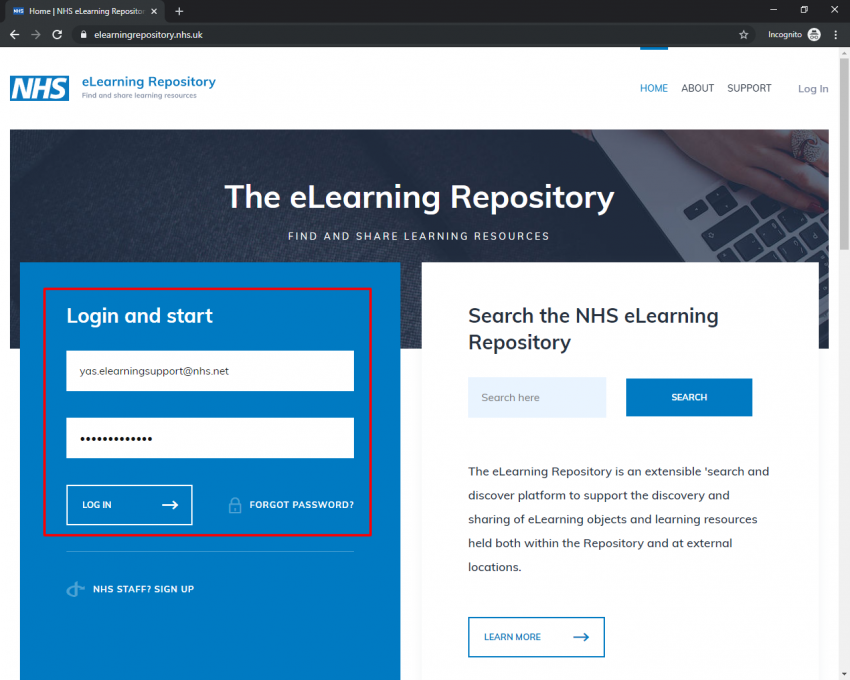The Learning Hub will be a new digital platform that will provide easy access to a wide range of resources that are pertinent to education and training in health and care. Users will be able to contribute digital resources (including e-learning, video, audio, images, documents, web links, articles etc) and search, and access the variety of learning resources that will have been contributed by stakeholders and the health and care workforce to support system readiness and recovery from the pandemic.
Health Education England’s (HEE) Technology Enhanced Learning team will be releasing the Learning Hub, with core functionality, at the end of May 2020. The Learning Hub is being released to support the Coronavirus (COVID-19) response by enabling the health and care workforce to share and access resources during the pandemic.
New features will be released frequently in line with the original plan for the functionality of the Learning Hub in its Beta phase and this will include the migration of two national platforms: the NHS eLearning Repository and eWIN. Information on the planned migration activities will be shared in the coming weeks and well in advance of the migrations taking place.
Work to prepare for the two migrations has been ongoing and continues to progress.
Publishers of content on the NHS eLearning Repository are urged to continue with the data cleansing activities necessary to ensure current resources are successfully migrated. These include ensuring the publisher’s name, email address and organisation are correct and more focused data cleansing is undertaken to deliver an accurate and complete set of data, optimising the resources’ searchability once migrated to the Learning Hub. We need the assistance of publishers of content on the NHS eLearning Repository to review and update the data fields listed in the table below, following the guidance provided.
| NHS eLearning Repository field name | Mandatory | Action | |
| Content[1] | Title | ✔ |
|
| Description | ✔ |
| |
| Keywords | ✔ |
| |
| Resource Type | ✔ |
| |
| License Types | ✔ |
| |
| Contributor | ✖ |
| |
| User[3] | Publisher | ✔ |
|
| Publisher email address | ✔ |
| |
| Organisation of publisher | ✔ |
|
[1] Search for content, click on edit, make corrections as necessary and save when complete.
[2] Fully populate both the description and the keywords where possible. If a choice must be made, preference should be given to the keywords.
[3] Click on the username in the right-hand corner, click edit, make amendments and save when complete.
| The Licenses | Definition |
| Creative Commons (E&W) Attribution, Non-commercial | This license lets others remix, adapt, and build upon your work non-commercially, and although their new works must also acknowledge you and be non-commercial, they don’t have to license their derivative works on the same terms. |
| Creative Commons (E&W) Attribution, Non-commercial, ShareAlike | This license lets others remix, adapt, and build upon your work non-commercially, as long as they credit you and license their new creations under the identical terms. |
| Creative Commons (E&W) Attribution, Non-commercial, No Derivatives | This license is the most restrictive of the common licenses, only allowing others to download your works and share them with others as long as they credit you, but they can’t change them in any way or use them commercially. |
| All rights reserved | All Rights Reserved copyright means that the copyright holder reserves for their own use, all of the rights provided by copyright law. Typically, if materials are copyrighted with all rights reserved, users are not allowed to republish them without the copyright holder’s explicit permission. |
If you have any questions or require further support, please
contact the NHS eLearning Repository Support Team on: yas.elearningsupport@nhs.net.
For more information about the Learning Hub
follow Twitter: @HEE_TEL, visit: telblog.hee.nhs.uk to read blogs about the journey so far or visit: www.hee.nhs.uk/tel.
